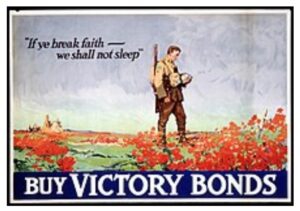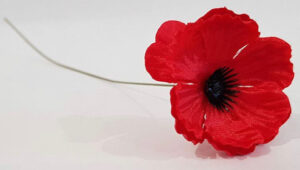It’s Memorial Day, the last Monday in May when we honor those who have died while serving in the U.S. military. The women and men who gave the ultimate sacrifice for their country – and our freedom.
There is nothing more noble.
You probably know that wearing a single red poppy is a Memorial Day tradition of remembrance that began after World War I ended.
Every year around this time, you’ve likely been offered one held together with green wire from a military veteran while waiting at a traffic light. Maybe you even donated something to show support of our troops.
During the Great War, as World War I came to be known, the common red field poppy was one of the first plants to reappear in the war-torn battlefields and cemeteries of Europe. Poppy seeds scattered in the wind and sat dormant, germinating only when the ground was disturbed, as it was during wartime in France and Belgium from 1914-1918.
For many, poppies were a much-needed splash of color amid the devastated post-war landscape.
The poppy became a symbol of lives lost, but also one of remembrance and recovery – and the subject of a now-famous memorial poem called “In Flanders Fields”:
In Flanders fields, the poppies blow Between the crosses, row on row, That mark our place; and in the sky The larks, still bravely singing, fly Scarce heard amid the guns below. We are the dead, short days ago We lived, felt dawn, saw sunset glow, Loved and were loved, and now we lie In Flanders fields. Take up our quarrel with the foe: To you from failing hands we throw The torch; be yours to hold it high. If ye break faith with us who die We shall not sleep, though poppies grow In Flanders fields.

According to Veterans Administration Canada, a Canadian soldier named John McCrae saw poppies scattered throughout the battlefield surrounding his artillery position at the Second Battle of Ypres in Belgium. They were beginning to bloom between crosses marking soldiers’ graves.
It was there – sitting in the back of a medical field ambulance on May 3, 1915 – that Lieutenant-Colonel McCrae, also a physician and poet, was inspired to write “In Flanders Fields” a day after his closest friend, Lieutenant Alexis Helmer, was killed and buried in a makeshift grave with a simple wooden cross. Three years later, McCrae died of pneumonia.
You’re probably wondering where this blog is going and what the heck all of this has to do with the price of beans. Or with me, for that matter.
Here goes: I had heart surgery was three years ago on the last day in May. So, I like to think of Thursday, May 31, 2018, as my own personal remembrance day.
On that day, I survived my second major cardiac surgery to repair a leaky mitral valve that caused my heart to work overtime and beat way too fast. Luckily, I won that battle, as well as my first, nearly 20 years ago, with an open-heart surgery to remove a rare cardiac tumor. That’s a story for another time.
Trust me, my special day in May is in no way meant to diminish Memorial Day’s traditional meaning. Courage and personal sacrifice aside, I simply trusted the science and kept the faith.
That’s what it seems like now, anyway.
Sometimes you forget how hard things were because they’re replaced by new things that matter so much more.
Like avoiding a deadly disease in a global pandemic.
As nearly 600,000 Americans have found out since last year, life can take a sharp downward turn very quickly.
Embrace each day. Be grateful. Heart matters.
Get yourself a poppy.





8 Comments
Kathie Grevemeyer
Thank you for relating how the poppy became a symbol. Nice to understand the why and hows of a symbol we know half the story about.
Jennifer John
Thanks, Kathie.❤️🇺🇸
mrmiller48
Lovely post. Hard to believe your surgery was 3 years ago. Seems longer. So grateful for you, too, as well as Rebecca.🥰
Jennifer John
It does. Back atcha, Bamz!❤️🇺🇸
Lynne Krieg
Loved this post. Found all old ones in my Gmail. Will take time to read.😚
Jennifer John
You, FOMO! Thanks for reading.❤️
Cheryl Johns
❤️
Jennifer John
❤️🌺